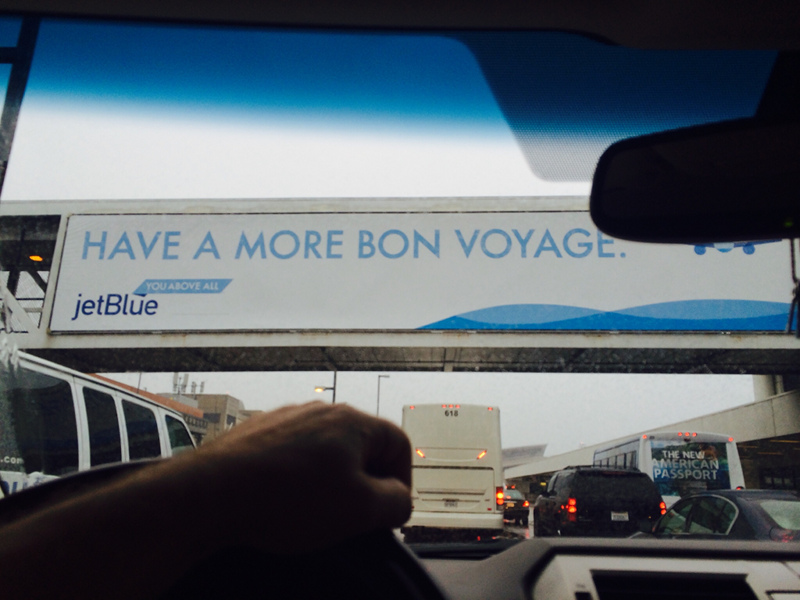More bon voyage
« previous post | next post »
Perry C. writes:
I hope you've been well. I am an active reader of language log and often notice posts that point to odd phrases. On my way back to Penn, jetblue had a sign at LAX that read "have a more bon voyage." I'm not sure of the meaning that the sign (attached below) is trying to convey. Any explanation?
"Bon voyage" being French for "(have a) good trip", I guess that Jet Blue is wishing you a better-than-good trip, or at least implying that your trip will be better if you fly with them.
It follows from general principles of borrowed-phrase morphology, as well as from other considerations, that urging you to "have a boner voyage" would be inappropriate.

Q. Pheevr said,
January 14, 2015 @ 7:48 pm
I guess they could have said, "Have a meilleur voyage." But that lacks a certian je ne sais quoi.
Bobbie said,
January 14, 2015 @ 8:03 pm
A restaurant can advertise that it wants diners to "have a more bon appetit"
fs said,
January 14, 2015 @ 8:21 pm
Have amore! (accent change) bon voyage!
David Morris said,
January 14, 2015 @ 8:26 pm
Have a bonner voyage!
D-AW said,
January 14, 2015 @ 8:41 pm
At least "Please go away often" made some sense — "Have more bon voyages," maybe. But "Have a more bon voyage" … a moribund voyage, sounds like.
Vicki said,
January 14, 2015 @ 9:28 pm
An ad agency's bilingual pun, I think, mixing the Anglicized "bon voyage" in the sense of "goodbye" as well as "have a good trip" with "better." As Q. Pheevr says, "meilleur" lacks something, and would slow the Anglophone ad-reader down.
Alicia said,
January 14, 2015 @ 9:37 pm
I immediately understood it as "have a better trip" and found it kind of cute.
LassLisa said,
January 15, 2015 @ 2:39 am
It's actually a perfectly composed cute turn of phrase to me. You've got the fixed phrase in English of "Bon voyage!" ("Have a good trip") combined with the meaning of "bon" in the original French the phrase was borrowed from, and then "voyage" works in the English as well.
So you can tell that it means "have a (more bon = better) voyage" but it's also got the phrase 'bon voyage!' in there without any sort of modification or interruption (as opposed to "bon-er" or "meilleur" which would break up the phrase). So all of those meanings get superimposed, and all of them mean "Have a better trip", but with a little bit of cute international-but-familiar flair. Well done, Jet Blue ad writer! well done.
Ben Hemmens said,
January 15, 2015 @ 2:50 am
well they're a low-cost airline, aren't they? evidently not splurging on slogan writers …
Ginger Yellow said,
January 15, 2015 @ 5:08 am
I think the message they're conveying is "we don't think our customers would understand 'meilleur'".
Robert T McQuaid said,
January 15, 2015 @ 6:14 am
Have a gooder trip!
richardelguru said,
January 15, 2015 @ 7:28 am
'Have a bonner voyage' is much less salacious that 'Have a boner voyage'…
Captain Bringdown said,
January 15, 2015 @ 11:19 am
Drats, richardelguru, you beat me to it!
JQ said,
January 15, 2015 @ 1:30 pm
Has everyone pronounced the "voyage" in the French way even if they don't speak French?
Catanea said,
January 15, 2015 @ 3:28 pm
"bon voyage" in the sense of "goodbye"
Bon voyage means "goodbye"?
Chris said,
January 15, 2015 @ 3:47 pm
I think the clever slogan writer is counting on the idea that most people know the fixed phrase "Bon voyage!" AND that they *also* have a vague idea that "Bon" in that phrase means "good."
The slogan wouldn't work so well if they didn't have both understandings.
The humor comes from juxtaposing two things most people recognize as *not* belonging together under normal rules.
Nathan Myers said,
January 15, 2015 @ 11:44 pm
Here is what really happened: A clever sloganeer mocked up an ad with "Bonner Voyage". Then, some killjoy manager (or Client) decided it was ungrammatical that way.
Bad managers, many of whom once did things but now can only watch, have to jigger things in order to feel like they're working. Good managers hire people smarter than they are, and make sure to keep the goals in clear view. I had a designer friend who always left a flaw for her manager to nip at so she would leave the other choices alone. Any commercial designer can cite similar experiences. Commercial design is a tragic fate for an artist.
Anyway that's what my money is on.
AB said,
January 16, 2015 @ 9:23 am
Sometime copywriter here, strongly concurring with Nathan's intuition.
Owlmirror said,
January 16, 2015 @ 10:17 am
I dunno; I think "bonner" could easily be misread (perhaps deliberately) as "Donner", which would not be perceived by those who know an anthopophagous bit of US history as being more bon.
Dan Curtin said,
January 16, 2015 @ 1:25 pm
Hmm, that's a matter of taste I suppose:
"I dunno; I think "bonner" could easily be misread (perhaps deliberately) as "Donner", which would not be perceived by those who know an anthopophagous bit of US history as being more bon."
Gregory Kusnick said,
January 16, 2015 @ 2:46 pm
"Have a bonnier voyage" works when traveling to Scotland.
hector said,
January 16, 2015 @ 4:12 pm
Hope I'm not overstepping anyone's bounds here, but when I was young I had a friend who was terrified of flying, and had come to the conclusion that the only way to fly was "drunk with a hard-on." So he'd bring along a dirty book to read (hey, it was the early 70s!) and drink as much as they'd let him.
"Have a boner voyage," indeed.
Roger Lustig said,
January 17, 2015 @ 12:01 am
Mo' better [jet] blues.